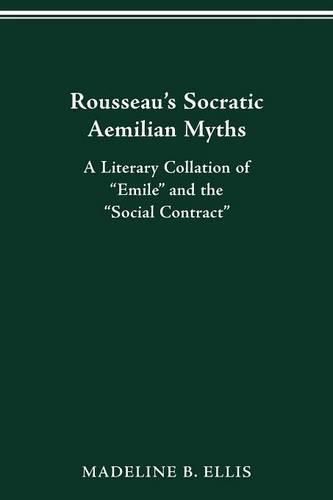Readings Newsletter
Become a Readings Member to make your shopping experience even easier.
Sign in or sign up for free!
You’re not far away from qualifying for FREE standard shipping within Australia
You’ve qualified for FREE standard shipping within Australia
The cart is loading…






This title is printed to order. This book may have been self-published. If so, we cannot guarantee the quality of the content. In the main most books will have gone through the editing process however some may not. We therefore suggest that you be aware of this before ordering this book. If in doubt check either the author or publisher’s details as we are unable to accept any returns unless they are faulty. Please contact us if you have any questions.
In this illuminating study of two literary milestones in the history of our civilization, a noted Rousseau scholar examines for the first time the nature of, and inspiration for, the symbolic language that informs Rousseau’s two great masterworks. Though Rousseau himself, in the pedagogical novel, invites such a study by including an aesthetic profession of faith and by warning the reader more than once that he is using the language of symbolic expression, Rousseauist criticism has, beyond noting the presence of a few symbols in Emile, produced as yet no systematic inquiry into the emblematic conveyance of ideas therein. Professor Ellis’s scrupulous collation of the texts of the two books and her adroit use of the Old and New Testaments and the Platonic dialogues reveal for the first time that not only is the Social Contract an appendix to Emile, as Rousseau says it is, but also that the two together constitute a Rousseauist version of Plato’s Republic and Symposium transfigured by Judeo-Christian and biblical tradition. Although once again Rousseau himself invites such a comparison by calling both Christ and Socrates, or Plato, his master, a distinction he accords to no one else, scholars have consistently ignored this invitation as they have the first. Dr. Ellis’s study conclusively demonstrates that the imagery of these ancient writings, which is also Rousseau’s, is the real clue to the relationship between the pedagogical novel and its political appendix. Madeleine B. Ellis is professor of French literature and humanities at Marianopolis College, Montreal, and the author of Julie or La Nouvelle Heloise: A Synthesis of Rousseau’s Thought (1749-1759); Robert Charbonneau et la creation romanesque: une etude de textes; Saint-Denys Garneau: art et realisme; and Rousseau’s Venetian Story: An Essay upon Art and Truth in Les Confessions.
$9.00 standard shipping within Australia
FREE standard shipping within Australia for orders over $100.00
Express & International shipping calculated at checkout
This title is printed to order. This book may have been self-published. If so, we cannot guarantee the quality of the content. In the main most books will have gone through the editing process however some may not. We therefore suggest that you be aware of this before ordering this book. If in doubt check either the author or publisher’s details as we are unable to accept any returns unless they are faulty. Please contact us if you have any questions.
In this illuminating study of two literary milestones in the history of our civilization, a noted Rousseau scholar examines for the first time the nature of, and inspiration for, the symbolic language that informs Rousseau’s two great masterworks. Though Rousseau himself, in the pedagogical novel, invites such a study by including an aesthetic profession of faith and by warning the reader more than once that he is using the language of symbolic expression, Rousseauist criticism has, beyond noting the presence of a few symbols in Emile, produced as yet no systematic inquiry into the emblematic conveyance of ideas therein. Professor Ellis’s scrupulous collation of the texts of the two books and her adroit use of the Old and New Testaments and the Platonic dialogues reveal for the first time that not only is the Social Contract an appendix to Emile, as Rousseau says it is, but also that the two together constitute a Rousseauist version of Plato’s Republic and Symposium transfigured by Judeo-Christian and biblical tradition. Although once again Rousseau himself invites such a comparison by calling both Christ and Socrates, or Plato, his master, a distinction he accords to no one else, scholars have consistently ignored this invitation as they have the first. Dr. Ellis’s study conclusively demonstrates that the imagery of these ancient writings, which is also Rousseau’s, is the real clue to the relationship between the pedagogical novel and its political appendix. Madeleine B. Ellis is professor of French literature and humanities at Marianopolis College, Montreal, and the author of Julie or La Nouvelle Heloise: A Synthesis of Rousseau’s Thought (1749-1759); Robert Charbonneau et la creation romanesque: une etude de textes; Saint-Denys Garneau: art et realisme; and Rousseau’s Venetian Story: An Essay upon Art and Truth in Les Confessions.